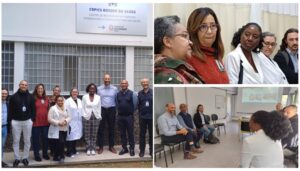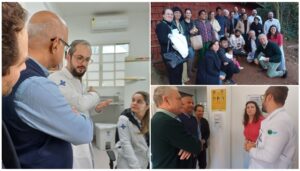On June 10 and 13, 2025, representatives from the Pan American Health Organization (PAHO) and the World Health Organization (WHO) conducted a technical visit to two municipal integrative and indigenous health services in São Paulo, Brazil, with the aim of learning about innovative experiences and discussing the Global Library of Traditional Medicine, developed by BIREME and the WHO Global Traditional Medicine Center (WHO GTMC).
The visits were coordinated by the Municipal Health Secretariat (SMS-SP), through the Technical Area of Integrative Health/PICS, under the leadership of Adalberto Kiochi Aguemi, director of the Health Promotion Division. Representing PAHO and WHO were Geetha Krishnan Pillai, head of Research and Evidence at WHO GTMC; João Paulo Souza, director of the Latin American and Caribbean Center on Health Sciences Information (BIREME); and Daniel Gallego-Pérez, consultant in the Department of Health Systems and Services (HSS).
Reference Center for Integrative and Complementary Practices (CRPICS) Bosque da Saúde
On June 10, the delegation visited CRPICS Bosque da Saúde, in the southeastern region of São Paulo. At the meeting, the SMS-SP teams shared experiences with the integrated health care model, implemented in the context of the National Policy for Integrative and Complementary Practices (PNPIC) in Brazil’s Unified Health System (SUS), and the Municipal Quality of Life Program with Traditional Medicines and Integrative Health Practices. As well as seeing the unit’s facilities, they were shown the results, structure and scope of the initiative, which has been running since 2001, offering 22 practices such as acupuncture, yoga, meditation, circular dance, and auriculotherapy, among others.
The highlight is Integrative Community Therapy (ICT), a modality aimed at promoting health and relieving mental suffering, which is carried out in group conversation sessions mediated by a trained community therapist, and which is considered an original practice in Brazil. Another local innovation is the Multiprofessional Residency Program in Integrative and Complementary Health Practices, the first in the country aimed at the technical training of health workers, with 5760 hours of theoretical and practical learning.
“It gives me immense pride to see Brazil as an exponent and guardian of ancestral practices, preserving this storehouse of care for future generations. As a trainer of health professionals, it’s exciting to realize that new doctors recognize, already during their training, the importance of complementarity beyond biomedicine. Brazilian practices such as capoeira, community therapy and phytotherapy are arousing international interest and show Brazil’s strength in innovating and contributing genuine, humanizing solutions to global health. In such challenging times, offering light technologies that are deeply rooted in our culture has enormous value for public health,” stated Jussara Otaviano, a nurse at the Afinando Vidas Institute and responsible for training community therapists.

Basic Health Unit (UBS) Indigenous Village Jaraguá Kwarãy Djekupé
On June 13, the team visited the UBS Indigenous Village Jaraguá Kwarãy Djekupé, located in the Jaraguá Indigenous Land, in the northern region of São Paulo, a territory that is home to around 850 people of the Guarani ethnic group, spread over seven communities. The unit is a reference in valuing indigenous protagonism: of the 27 professionals in the Indigenous Primary Health Care Multidisciplinary Team, 18 are indigenous, working in roles ranging from management to social assistance, and including health agents, nurses, sanitation agents, among other technical and administrative areas.
Visitors were welcomed in the okã (prayer house), a sacred space for the Guarani, who see health as inextricably linked to spirituality and cultural preservation. The welcome included songs, dances and traditional rituals such as the “tchondaro”, led by around 20 members of the community. During the visit, indigenous leaders shared their perspectives on the role of the health service, the appreciation of traditional practices and priority demands, such as strengthening indigenous health, institutional recognition and representation in national and international forums. In an atmosphere of exchange and communion, the experience ended with the sharing of typical food prepared for the occasion – “txipá” (fried bread served with honey), boiled corn and sweet potatoes, and lemon balm tea.
For Adalberto Aguemi, the importance of this visit lies precisely in getting closer to a relevant center of scientific documentation and valuing the systematization of traditional medicines. “Knowledge is not just conventional biomedical knowledge; there is ancestral knowledge, transmitted orally by various peoples, which we need to strengthen. This global initiative led by BIREME and WHO is fundamental to preserving endangered cultures, sharing health promotion practices and creating instruments to face new and historic challenges,” he said, highlighting the potential benefits that this expanded vision of health, science and care has for communities.

Local knowledge, global relevance
The visits reinforce the importance of recognizing, documenting and valuing health practices that dialogue with traditional knowledge and the cultural diversity of territories. For João Paulo Souza, director of BIREME, these are experiences that broaden the view of public health and inspire innovative and integrative solutions on a global scale.
“The indigenous medicine practices of the Guarani people – which include traditional food, physical exercise, the use of medicinal herbs from the Atlantic Rainforest, as well as integrative practices such as morning conversations about dreams and a worldview focused on harmonious coexistence with the environment – have contributed to the health and “buen vivir” of the original populations in the territory that today corresponds to the state of São Paulo for hundreds of years. Recognizing and valuing these practices, linking them with regular health services, represents an opportunity for mutual growth and intercultural strengthening,” said the director. Through a request for technical cooperation, BIREME will seek to support the codification of these traditional practices in health information systems, as well as contributing to their visibility and valorization in the context of the TMGL.